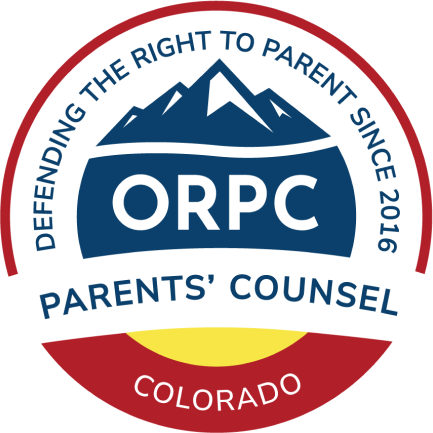Governor Polis Signs House Bill 23-1024 into law
Bill prioritizes and supports kin and relative placements for families involved in dependency and neglect cases
DENVER (June 8, 2023) – Colorado House Bill 23-1024 (HB 23-1024), which the Colorado Office of Respondent Parents’ Counsel (ORPC) drafted, stakeholdered, and supported throughout the session, passed UNANIMOUSLY out of both the House and Senate, never receiving a no vote. This bill, at long last, prioritizes relative and kin placements while enhancing engagement of relatives. On Monday, Governor Polis held a public ceremony to sign this landmark bill into law. HB 23-1024 strengthens families by prioritizing placement of children with relatives and kin over non-relative foster care. ORPC appreciated the support of organizations including the Kempe Foundation, Office of the Child’s Representative, and the Colorado Criminal Justice Reform Coalition. Representative Serena Gonzales-Gutierrez, Representative Elisabeth Epps, Senator Tony Exum and Senator Kevin Van Winkle sponsored the bill.
House Bill 23-1024 ensures children who cannot safely remain with their parents have the opportunity to be raised by their families whenever safely possible and restructures foster parent intervention so relatives and kin do not have to hire a lawyer or battle in court to care for their family.

Key measures include:
- Creating a preference for placement with relatives and kin who are capable, willing, and available for care.
- Help for relatives and kin to better understand opportunities to receive financial support and benefits.
- Requiring the County to make efforts to assist relatives and kin with obtaining resources if that is a barrier to placement.
- Encouraging earlier engagement with relatives and kin and strengthening the notice relatives receive to help them become involved earlier.
- Ensuring relatives and kin have the same rights afforded foster parents in the Foster Parent Bill of Rights.
- Prohibiting discrimination against relatives and kin due to socioeconomic status, age, disability, and immigration status.
- Reducing delay for families by requiring hearings on placement with relatives occur within two months of the request for placement.
- Restructuring foster parent intervention to reduce litigation during the first twelve months of the case to ensure that children have every opportunity to reunify with their families when possible.
“I have seen the impact that has happened to our kids and our families when they are separated when there might be options for them to be with relatives or kinship providers…so that families can stay together,” shared Representative Serena Gonzales-Gutierrez at the bill signing. “We know, not only in the state of Colorado but across the country, that a disproportionate amount of children that are in this system are are kids of color. Disproportionately they are removed from their families who look like them, who have the same culture, who have the same traditions. This [bill] is a way to ensure that we are able to keep those ties.”
Representative Elisabeth Epps added, “One of the most important ways for us to continue to be a leader is in leading and acting on policy that enacts and codifies how to best take care of our families…What is so important about today as we celebrate ORPC whose very existence and creation is a testament to how Colorado can and should and must lead on these issues…We make sure that we do everything we can to support our families and keep them together so that foster care is reserved for folks where that is the most appropriate option.”
The bill enforces the work of ORPC to increase equity in the child welfare system, support parents as they navigate the complex child welfare and judicial systems, and help parents advocate for their families to be stronger together.
“This is an opportunity to make sure that families can stay together and be rejoined,” said Senator Tony Exum. “Kids really do better with next of kin or with their parents.”
Children and youth placed with relatives or kin experience greater placement stability, reduced separation trauma, lower rates of trauma from institutional abuse, better behavioral and mental health outcomes, preservation of identities, and higher rates of reunification with parents than children and youth placed in foster homes. When family reunification and kinship guardianship are supported and prioritized, protective factors increase and promote current and future well-being.
The bill signing coincides with National Reunification Month which is celebrated annually in June to recognize the people around the country who help reunify, strengthen and support families who are involved in the child welfare system.
###
The Colorado Office of Respondent Parents Counsel (ORPC) is an independent state agency that supports Colorado parents in the fight to preserve families in dependency and neglect cases. Since 2016, ORPC has protected the right to parent by recruiting and training attorneys statewide, advocating for family-centered policies, and promoting equity and transparency in the family regulation system through data. As a result of our work, more families are reunified and stronger together. Learn more at coloradoorpc.org.


